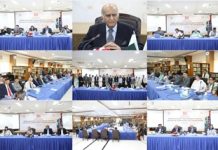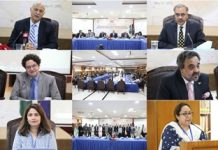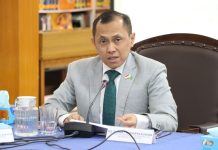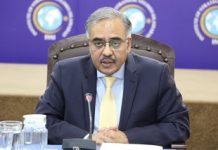Remarks by DG ISSI Ambassador Sohail Mahmood, at Seminar on
“Kartarpur Corridor: Pakistan’s Initiatives for Peace and Harmony”,ISSI
20 March 2025
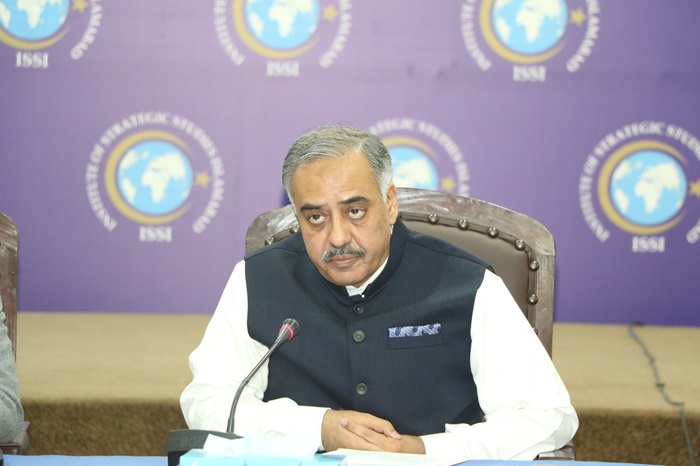
It is a great pleasure to welcome everyone to the ISSI. It is fitting that this Seminar is being held in Ramazan, when the spirit of solidarity is at a wholly different level.
We have a panel of distinguished scholars, senior political figures, and faith leaders. It is an honour to have Dr. Qibla Ayaz, former Chairman of the Council of Islamic Ideology (CII), to share his precious thoughts. We look forward to his insightful intervention.
We are also glad to have Dr. Ramesh Kumar Vankwani, former Minister of State; Mr. Harmeet Singh, journalist and anchor; and Mr. Mohammad Abu Bakar Aftab Qureshi, CEO of the PMU, Kartarpur Corridor. Their varied and rich perspectives on the seminar’s theme would surely be highly illuminating.
Punjab Minister for Minority Affairs Sardar Ramesh Singh Arora’s presence amongst us as chief guest is of special significance. From the outset, he was engaged with the Kartarpur Corridor project and made a valuable contribution to its successful fruition. I take this opportunity to reiterate our sense of gratitude to him for his part.
Distinguished participants,
Last year, we completed five years since the inauguration of the Kartarpur Corridor on 9 November 2019. On 22 October 2024, Pakistan and India agreed to renew their agreement for the facilitation of pilgrims to visit Gurudwara Darbar Sahib Kartarpur for an additional five years. In the overall environment of strained India-Pakistan relations, both the inauguration of the Corridor in 2019 and the renewal of the agreement in 2024 appear nothing short of extraordinary.
For us, as part of these deliberations, it is important to put this historic initiative in perspective. It was a long-standing desire of the Sikh community in India to have access to one of their most sacred religious landmarks. Baba Guru Nanak, the revered founder of Sikhism, had spent the last 18 years of his life at the site of the Gurudwara Darbar Sahib Kartarpur, in district Narowal of present-day Pakistan. The sanctity of this place is also evident from the fact that Sikhs referred to it in their daily prayers.
While considering this request of the Sikh community, the Government of Pakistan made a three-fold determination: one, opening of the Corridor and thus enabling access to this sacred place of worship for the adherents of Sikh faith was in line with the Islamic principles; two, it was consistent with Pakistan’s policy of promoting inter-faith harmony; and, three, it was in sync with the Quaid’s vision of a peaceful neighbourhood. Accordingly, a positive decision was taken. It was also decided that the Corridor would be completed in the shortest possible time and inaugurated in November 2019, on the occasion of the 550th birth anniversary of Baba Guru Nanak. Islamabad hoped that Pakistan’s ‘Kartarpur Spirit’ could be a step forward in the right direction from conflict to cooperation, animosity to peace, and enmity to friendship.
A ground-breaking ceremony was held on 28 November 2018 and an official delegation comprising two Union Ministers, several dignitaries from the state of Punjab, and a large Indian media group attended the foundation stone laying ceremony.
Forging ahead with the plans, the first phase of the Kartarpur Corridor project and renovation of Gurudwara Darbar Sahib was completed in record time. This was accomplished under the able stewardship of then Director General FWO Maj. Gen. Inam Haider Malik, now Lt. Gen. and Chairman NDMA. Notably, it became the world’s largest Sikh Gurudwara.
In parallel, the governments of Pakistan and India engaged to negotiate and finalize the draft text of the agreement for the facilitation of pilgrims. The inter-agency delegation on the Pakistan side was led by the then Director General (South Asia) Dr. Mohammad Faisal, now our High Commissioner in London. This task was duly completed by the two sides after several rounds of talks and the agreement was signed on 24 October 2019.
In a briefing to the Diplomatic Corps on 6 November 2019, the Foreign Office informed that Pakistan will permit 5,000 Indian pilgrims of all faiths without visa, per day, seven days a week, throughout the year, with the provision for additional numbers on special occasions, subject to capacity. Besides the Kartarpur Corridor, pilgrims from India would be coming through Wagah border as well. Similarly, it was envisaged that thousands of pilgrims from across the world, especially from countries with large Sikh community, would come to Pakistan. As part of the series of events commemorating the 550th birth anniversary of Baba Guru Nanak, Pakistan also issued a special coin and a commemorative stamp. Arrangements were also made for the Diplomatic Corps’ visit to Kartarpur Sahib for the opening ceremony.
On 9 November 2019, the Corridor was formally inaugurated in a grand ceremony and in the presence of thousands of Sikhs from India and various parts of the world. The first pilgrims’ delegation from India coming through the Corridor was led by former Prime Minister Dr. Manmohan Singh, who described the occasion as a “big moment.” He also said: “I hope India and Pakistan relations improve enormously as a result of this beginning.”
The Indian delegation also included Punjab Chief Minister Capt. Amarindar Singh, Punjab politician Navjot Singh Sidhu, senior members of the SGPC and Akal Takht, celebrities like Sunny Deol, and a large Indian media contingent. They also expressed deep gratitude to Pakistan for meeting this long-standing request of the Sikh community and reviving access to Kartarpur Sahib after a gap of over 70 years. Navjot Sidhu remarked that the Sikhs’ “hearts have been won” with this one grand gesture.
Opening of the Kartarpur Corridor was indeed a momentous occasion. It should be recalled that just a few months earlier, on 5 August 2019, India had taken illegal and unilateral steps seeking to alter the internationally disputed status of Jammu and Kashmir and change the demographic structure of the occupied territory. This resulted in sharp deterioration of bilateral relations as Pakistan responded by downgrading diplomatic relations, suspending bilateral trade, and announcing the intention to review all bilateral agreements. The months following the Indian actions were marked by heightened tensions. Yet, the Government of Pakistan chose not to allow the Kartarpur Corridor project to be negatively affected by these developments. It remained firm in fulfilling its promise to the Sikh community. Thus, despite the Kashmir-related tensions, the project was duly completed and inaugurated on the stipulated date of 9 November 2019.
In February 2020, UN Secretary General Anontio Guterres visited Kartarpur and was overwhelmed by the experience. He said: “This is a very emotional moment…. and I cannot be here without having a very strong feeling. It is so wonderful to see interfaith dialogue. It is wonderful to see in the same shrine today Sikhs, Muslims, Christians, maybe Hindus — all worshipping in harmony and peace.”
The Secretary General added: “This is the best symbol that we can give for a world in peace and for a world in which there is mutual respect and there is the acceptance of what is different – recognising that diversity is a blessing, is richness, not a threat.”
Secretary General Guterres described Kartarpur Corridor as a practical example of Pakistan’s desire for peace, famously calling it a “Corridor of Hope” and a welcome symbol of inter-faith harmony.
Distinguished participants,
Pakistan remains steadfast in its commitment to dialogue and peace with India. We believe that initiatives like Kartarpur can serve as stepping stones towards a more cooperative regional environment. Confidence-building measures such as enhanced facilitation for pilgrims, people-to-people exchanges, and constructive result-oriented engagement can contribute to de-escalating tensions and promoting greater understanding.
To fully harness the potential of the Kartarpur Corridor, depoliticization of religious initiatives is imperative. It should be our common endeavour to ensure that Kartarpur continues to serve as a beacon of hope for generations to come.
At the ISSI, we recognize the Kartarpur Corridor as a pivotal case study in diplomacy, religious freedom, and conflict resolution. This seminar seeks to delve deeper into the broader implications of the Corridor, assessing its role in fostering inter-faith harmony, its diplomatic significance, and its potential as a confidence-building measure in South Asia.
I extend my gratitude again to all the distinguished speakers, experts, and participants. I am confident that your valuable perspectives will significantly contribute to our deliberations.
Thank you.




